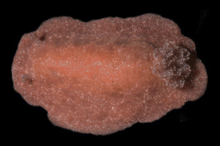Diaulula phoca
Diaulula phoca is a species of sea slug or dorid nudibranch, a marine gastropod mollusk in the family Discodorididae.[2]
| Diaulula phoca | |
|---|---|
 | |
| Dorsal view of Diaulula phoca. | |
| Scientific classification | |
| Kingdom: | |
| Phylum: | |
| Class: | |
| (unranked): | |
| Superfamily: | |
| Family: | |
| Genus: | |
| Species: | D. phoca |
| Binomial name | |
| Diaulula phoca (Ev. Marcus & Er. Marcus, 1967)[1] | |
| Synonyms | |
|
Discodoris phoca Ev. Marcus & Er. Marcus, 1967 | |
Taxonomy
This species was originally described under the name Discodoris phoca by Eveline Du Bois-Reymond Marcus and Ernst Gustav Gotthelf Marcus in 1967.[1] It is considered a member of Diaulula because of the presence of caryophyllidia.[3]
Distribution
Distribution of Diaulula phoca includes Florida, Honduras, Costa Rica, Brazil and Panama.[3]
The type locality is west side of the Key Biscayne island, Florida.[1] The holotype is stored in the National Museum of Natural History, Smithsonian Institution.[1]
Description
The body is oval.[3] Mantle is rigid.[3] Dorsum is covered with small caryophyllidia.[3] Body, rhinophores, and gill are dark purplish brown with numerous small opaque white dots.[3] It is up to 55 mm long.[1]
Ecology
It feeds on sponges.[1]
References
This article incorporates Creative Commons (CC-BY-4.0) text from the reference[3]
- Marcus Ev. & Marcus Er. (1967). "American opisthobranch mollusks". Studies in Tropical Oceanography 6: 1–256. pages 78-80, figures 99-101.
- Rosenberg, G. (2010). Diaulula phoca (Ev. Marcus & Er. Marcus, 1967). In: Bouchet, P.; Gofas, S.; Rosenberg, G. (2010) World Marine Mollusca database. Accessed through: World Register of Marine Species at http://www.marinespecies.org/aphia.php?p=taxdetails&id=532733 on 2012-03-01
- Goodheart J. A., Ellingson R. A., Vital X. G., Galvão Filho H. C., McCarthy J. B., Medrano S. M., Bhave V. J., García-Méndez K., Jiménez L. M., López G. & Hoover C. A. (2016). "Identification guide to the heterobranch sea slugs (Mollusca: Gastropoda) from Bocas del Toro, Panama". Marine Biodiversity Records 9(1): 56. doi:10.1186/s41200-016-0048-z